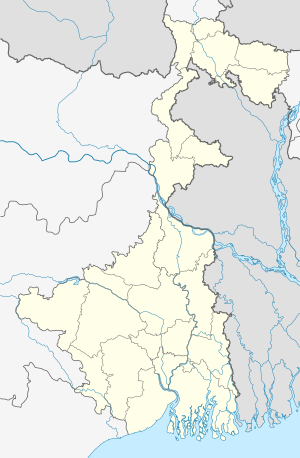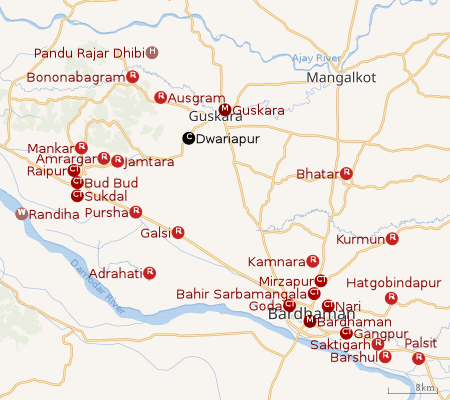Dwariapur, Bardhaman
Dwariapur (also spelt Dariapur) is a village under Dignagar II gram panchayat of Ausgram I block in Bardhaman Sadar North subdivision of Purba Bardhaman district in the Indian state of West Bengal.
Dwariapur | |
|---|---|
Village | |
 Dwariapur Location in West Bengal, India  Dwariapur Dwariapur (India) | |
| Coordinates: 23.464194°N 87.70043°E | |
| Country | |
| State | West Bengal |
| District | Purba Bardhaman |
| Government | |
| • Type | Panchayati raj (India) |
| • Body | Gram panchayat |
| Population (2001) | |
| • Total | 3.571 |
| Languages | |
| • Official | Bengali, English |
| Time zone | UTC+5:30 (IST) |
| PIN | 713156 (Gonna Dwariapur) |
| ISO 3166 code | IN-WB |
| Vehicle registration | WB |
| Lok Sabha constituency | Bolpur |
| Vidhan Sabha constituency | Ausgram |
| Website | purbabardhaman |
- For village of same name in Pirojpur District in the Barisal Division of southwestern Bangladesh see Dwariapur
Geography
 |
| Cities and towns in the Bardhaman Sadar North subdivision of Purba Bardhaman district M: municipal city/ town, CT: census town, R: rural/ urban centre, H: historical site, W: river project, C: craft centre Owing to space constraints in the small map, the actual locations in a larger map may vary slightly |
Location
Dwariapur is located at 23°27′51″N 87°42′02″E.
Demographics
As per the 2011 Census of India, Dwariapur had a total population of 3,571, of which 1,764 (49%) were males and 1,807 (51%) were females. Population below 6 years was 460. The total number of literates in Dwariapur was 2,302 (74.00% of the population over 6 years).[1]
Dhokra craft
There is a group of families involved in making dhokra craft at Dwariapur. They originally belonged to the former princely Bastar state in Central India, now Bastar district in Chhattisgarh. They migrated to what is now Dhenkanal district in Odisha and then on to Medinipur, Bankura, Purulia and Bardhaman - they were scattered all around. In Purba Bardhaman district, they settled in Dwariapur. They make metal castings by a process that is believed to have been practised from ancient times and they learnt the traditional intricacies from their fore-fathers.[2]
Around 1952, there were 15/ 16 families at Dwariapur involved in this metal craft. They made small metallic measuring bowls, small deities and decorative items and sold them to villagers. They were extremely poor and mostly illiterate. The artistry of their craft was appreciated and attracted attention. Subsequently, Government agencies stepped in. A few of them were taken to Kolkata for training in design centres in order to enlighten them about updating their practices. They were provided with loans and steps were taken to market their products.[2]
Provash Sen, a former Director of the Regional Design Centre at Kolkata of the All India Handicrafts Board, contributed substantially to the appreciation and improvement in the status of the dhokra craftsmen. In 1966, Sambhunath Karmakar received a national award from Dr. Sarvepalli Radhakrishnan, President of India, for his creation “Rath”. In 1971, Baikuntha Karmakar received a national award from V.V. Giri, President of India, for his creation “horse”. In 1986, Haradhan Karmakar received a national award from Gyani Zail Singh, President of India, for his creation “Laksmisaj”. In 1987, Matar Karmakar, then working at the Kolkata Design Centre, received the President’s Award and a cash reward of Rs. 10,000 from R. Venkataraman, President of India. In 1990, Haradhan Karmakar and Mahamaya Karmakar were sent to Small Scale Industries Centre at London for an exhibition of dhokra craft.[2]
In a report by the Micro, Small and Medium Industries Development Institute, it says that the degree of excellence of products like, sola craft of Bankapasi and dhokra of Dwariapur is now acceptable to European markets.[3]
An organization named NISTADS got involved in developing a new furnace for Dhokra artisans. The clash of modernity and traditions had its own problems. However, the modern furnace has found acceptance at both Dwaraipur and Bikna, some two hours by road, in Bankura district, another place where around 36 families are involved in the dhokra craft.[4]
Transport
State Highway 14, running from Dubrajpur (in Birbhum district) to Betai (in Nadia district), passes through Dwariapur.[5][6]
References
- "2011 Census – Primary Census Abstract Data Tables". West Bengal – District-wise. Registrar General and Census Commissioner, India. Retrieved 28 February 2017.
- Chattopadhyay, Akkori, Bardhaman Jelar Itihas O Lok Sanskriti (History and Folk lore of Bardhaman District.), (in Bengali), Vol II, pages 470-474, Radical Impression. ISBN 81-85459-36-3
- "Brief Industrial Profile of Burdwan district" (PDF). Pages 14-15 : 3.10 Industrial Scenario. MSME Development Institute, Kolkata. Retrieved 17 February 2019.
- "The Dhokra Artisans of Bankura and Dariapur, West Bengal: A Case Study and Knowledge Archive of Technological Change in Progress" (PDF). David Smith, Newport, UK and Rajesh Kochhar, New Delhi, India. Retrieved 25 April 2020.
- "List of State Highways in West Bengal". West Bengal Traffic Police. Retrieved 26 February 2017.
- Google Maps